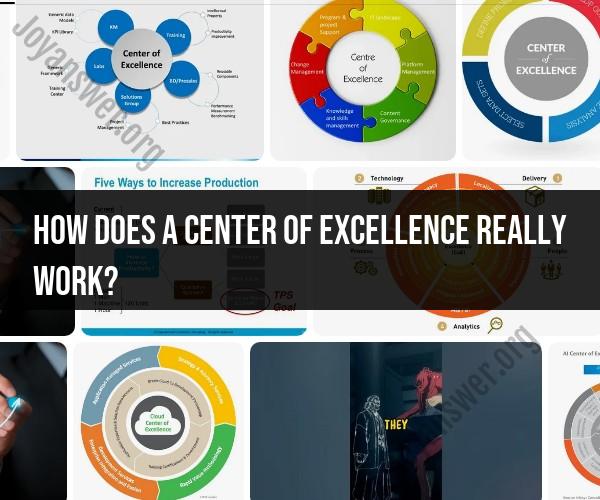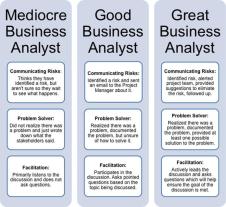How does a center of Excellence really work?
A Center of Excellence (CoE) is a specialized team or organizational unit within a company that focuses on a particular area of expertise, striving to achieve excellence and innovation in that domain. The inner workings of a Center of Excellence can vary based on its purpose and the specific needs of the organization, but there are common elements and principles that help define how CoEs function:
Definition of Purpose:
- A CoE begins with a clear definition of its purpose. It is established to address specific challenges, promote best practices, or drive innovation in a particular area, such as technology, business processes, or a specific industry.
Expertise and Specialization:
- CoEs consist of experts and specialists with in-depth knowledge and experience in their respective domain. They are responsible for driving excellence and staying up-to-date with the latest developments.
Resource Allocation:
- CoEs typically have dedicated resources, including staff, budget, and technology, to support their initiatives. This allows them to focus on their core mission.
Knowledge Sharing and Training:
- CoEs actively engage in knowledge sharing and training. They often offer guidance and training to employees in other parts of the organization to disseminate expertise and best practices.
Best Practice Development:
- CoEs are responsible for identifying and developing best practices and standards relevant to their area of expertise. They may also collaborate with industry partners and associations to ensure their practices are aligned with industry standards.
Innovation and Research:
- CoEs are often at the forefront of research and innovation in their field. They may conduct research, pilot new technologies, and explore emerging trends to help the organization stay competitive.
Problem Solving and Consultation:
- CoEs serve as internal consultants, helping other departments or business units address complex problems and challenges in their domain. They offer expertise and guidance in finding solutions.
Performance Monitoring and Metrics:
- CoEs use performance metrics and key performance indicators (KPIs) to track the impact of their initiatives and demonstrate the value they bring to the organization.
Continuous Improvement:
- CoEs are committed to continuous improvement. They review and refine their processes and practices to adapt to changing conditions and evolving needs.
Collaboration and Cross-Functional Teams:
- CoEs often collaborate with other parts of the organization to achieve their objectives. They may form cross-functional teams to work on specific projects or challenges.
Governance and Leadership:
- CoEs have governance structures and leadership roles. Leaders are responsible for setting the vision and strategy for the CoE.
Change Management:
- CoEs may be involved in change management efforts to help the organization adapt to new technologies, processes, or industry trends.
Communication and Reporting:
- Effective communication is crucial. CoEs share their findings, progress, and recommendations with senior management and relevant stakeholders.
Quality Assurance:
- CoEs are often responsible for quality assurance and ensuring that the organization's practices meet the highest standards.
Risk Management:
- CoEs may play a role in identifying and mitigating risks associated with their domain of expertise.
The success of a Center of Excellence depends on its ability to deliver value to the organization by driving innovation, solving complex problems, and promoting best practices. It requires a strong commitment to excellence, ongoing learning, and collaboration across the organization. The specific inner workings of a CoE may vary from one organization to another based on the nature of the CoE and the organization's unique goals and challenges.
How does a Center of Excellence function within an organization or industry?
A Center of Excellence (CoE) is a team of skilled knowledge workers whose mission is to provide the organization they work for with best practices around a particular area of interest. CoEs are typically established when there is a knowledge deficit or skills gap within an organization. For example, a company may form a new CoE to manage the adoption and integration of robotic process automation (RPA).
Once a CoE is established, it typically functions as a hub of knowledge and expertise for the organization. The CoE team may provide training, develop best practices, and conduct research on the topic of focus. The CoE team may also work to implement best practices across the organization and to troubleshoot problems.
What criteria are typically used to designate a Center of Excellence?
There is no single definition of a CoE, and the criteria used to designate a CoE may vary from organization to organization. However, some common criteria include:
- The CoE must have a clear focus or mission.
- The CoE must be staffed with experts in the field.
- The CoE must be able to provide value to the organization.
- The CoE must be able to share its knowledge and expertise with others in the organization.
Can you provide examples of successful Centers of Excellence in different fields?
Here are a few examples of successful Centers of Excellence in different fields:
- Technology: The CoE for DevOps at Google is responsible for developing and implementing best practices for DevOps across the company.
- Manufacturing: The CoE for Manufacturing Excellence at Toyota is responsible for developing and implementing the Toyota Production System, which is a lean manufacturing system.
- Healthcare: The CoE for Patient Safety at the Cleveland Clinic is responsible for developing and implementing best practices for patient safety across the health system.
How does being part of a Center of Excellence benefit organizations and their customers?
There are a number of benefits to being part of a CoE, both for organizations and their customers.
For organizations, CoEs can help to:
- Improve the quality of work
- Increase productivity
- Reduce costs
- Develop and retain talented employees
- Enhance the organization's reputation
For customers, CoEs can help to:
- Improve the quality of products and services
- Reduce the cost of products and services
- Increase customer satisfaction
What are the key challenges in establishing and maintaining a Center of Excellence?
There are a number of challenges in establishing and maintaining a CoE, including:
- Securing funding
- Attracting and retaining top talent
- Developing and implementing a clear mission and strategy
- Measuring the success of the CoE
- Integrating the CoE into the organization
Despite the challenges, CoEs can be a valuable asset for organizations and their customers. By overcoming the challenges, organizations can establish and maintain CoEs that provide significant benefits.
In addition to the above, here are some other key challenges in establishing and maintaining a CoE:
- Getting buy-in from leadership: It is important to have the support of leadership in order to establish and maintain a CoE. Leadership must be willing to provide the CoE with the resources it needs to be successful.
- Managing change: Establishing a CoE often requires changes to the way the organization operates. It is important to manage these changes carefully to minimize disruption.
- Measuring success: It can be difficult to measure the success of a CoE. It is important to develop clear metrics and to track progress over time.
By addressing these challenges, organizations can increase the chances of establishing and maintaining a successful CoE.













